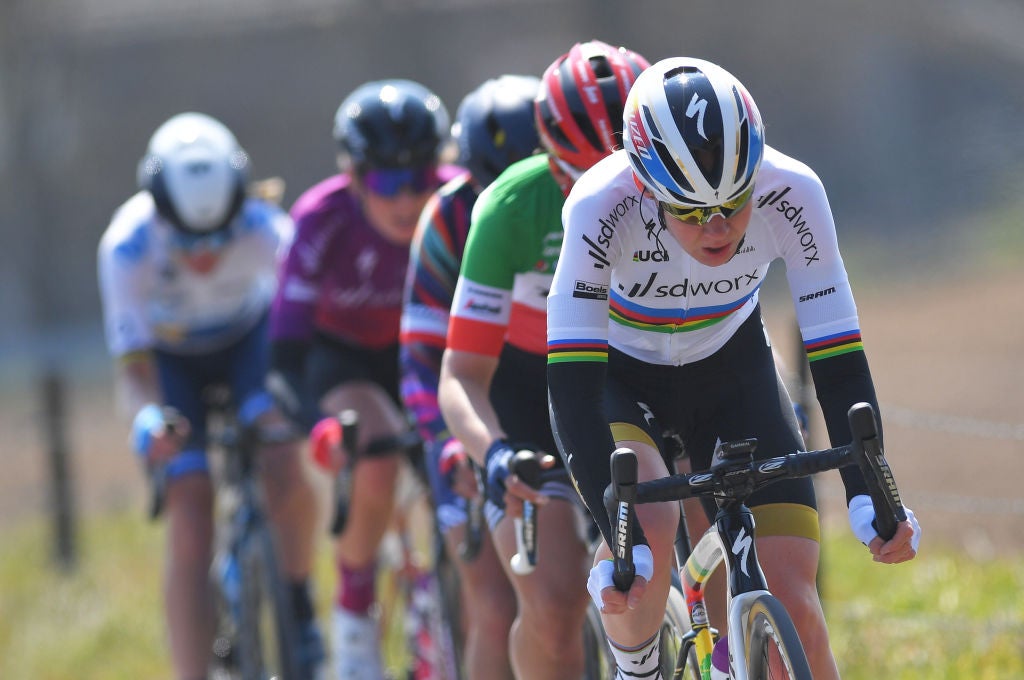The Cyclists' Alliance publishes results of latest rider survey

Anna van der Breggen set a brutal pace in the Liège-Bastogne-Liège winning move (Photo: Luc Claessen/Getty Images)
The results of the 2021 Cyclists’ Alliance (TCA) rider survey are in, and the disparities in professionalism between UCI Women’s WorldTeams (WWT) and UCI Continental women’s road teams emerged as a recurring theme.
Salary headlined rider concerns on both WorldTeams and Continental teams, with 86 percent of women surveyed agreeing that salaries for women’s professional cycling are too low for the level of commitment.
Read also: PYSO, ep. 59: The Cyclists’ Alliance founder Iris Slappendel on creating change
The number of female riders receiving no salary at all has increased from 17 percent in 2018 to 34 percent this year.
97 cyclists responded to the 2021 TCA rider survey, which was organized by topics within three sections: Working Conditions, Legal and Ethics, and Team Culture. So far, only results to the Working Conditions section have been published by the advocacy group.
One major takeaway was the vast difference in the working conditions between the Women’s WorldTeams and UCI Continental women’s road teams.
The UCI Women’s WorldTeam designation debuted ahead of the 2020 season. To qualify, the UCI required a guarantee of a four-year financial commitment by a team’s sponsors and then mandated that those teams award certain benefits, including minimum salary and healthcare, to its riders.
Read also: Teams and riders are hopeful as UCI launches Women’s WorldTour reforms
In 2021, there were 160 riders on the nine Women’s WorldTeams, while 771 women raced for 41 UCI Continental squads. From minimum salaries to contractual inclusions to COVID-19 working conditions, riders on the WorldTeams reported a more professional working environment.
Currently, only riders on WorldTeams are entitled to a fixed minimum salary. In 2021, that was €20,000 for employed and €32,800 for self-employed (the majority of WWT riders are self-employed).
From riders on Continental teams who responded to the survey, only two made €30,000-40,000 while all others surveyed made less than €19,999, or nothing at all.
In terms of contractual inclusions, 94 percent of WorldTeam riders surveyed reported medical support within their contract, while only 33 percent of Continental riders did. 11 percent of WWT riders reported having a pension plan compared to 0 percent of continental riders.
Read also: The Cyclists’ Alliance: Women’s cycling faced unique set of challenges due to COVID-19
Riders across all categories have been less impacted by COVID-19 in 2021 than last year. In 2020, 29 percent of riders experienced a salary reduction or lost it entirely, whereas in 2021 only five percent of riders on WorldTeams had their salary reduced and only one percent of riders on Continental teams lost their salary entirely in 2021 due to the COVID-19 pandemic.
However, 20 percent of riders on Continental teams reported having to pay for their own COVID-19 testing in order to travel to races, while 94 percent of WorldTeam riders said that COVID-19 testing was included and covered by their employment contract.
In 2021, the UCI appointed independent auditor EY Lausanne to investigate the impacts of salaries on WorldTeam riders but did not audit the salaries of Continental riders. Furthermore, the governing body has said it intends to increase the number of WorldTeams and riders on those teams.
Read also: Five women’s UCI continental teams to watch in 2021
At the end of the survey, riders were also asked to select the top three issues they would like to see addressed by TCA. A minimum wage for all riders, as well as increasing live TV coverage of races tied with 21 percent of riders selecting them as priorities. More racing opportunities for younger riders were the next most important, selected by 11 percent of riders.
The Cyclists’ Alliance will use the results of the survey to continue advocating for a safe and stable working environment for the entire women’s peloton.